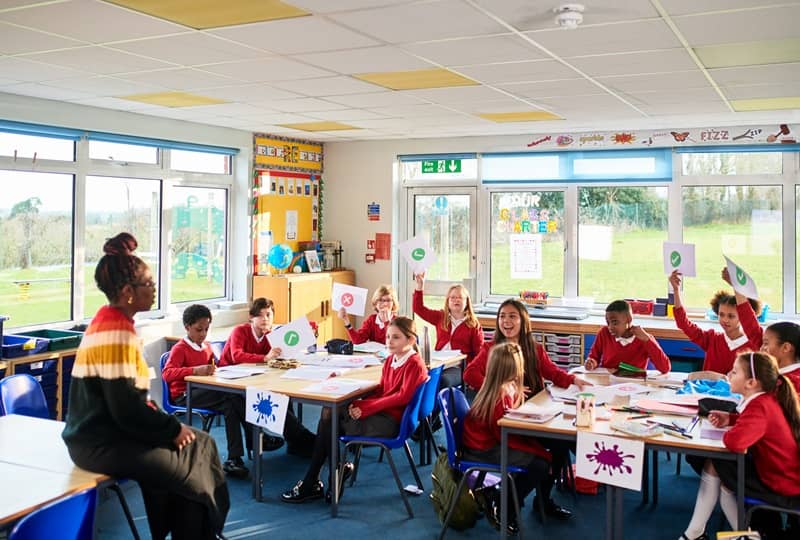
Lending Superman a Hand
By Darla Romfo
The award-winning documentary Waiting for “Superman” (2010 Sundance Film Festival) captures many of the deficiencies in our public education system with tear-jerking accuracy. It is a good movie, but it doesn’t go far enough in arguing for better educational choices for America’s children.
Director Davis Guggenheim and several of the experts he interviews argue that charter schools have finally figured out how to educate poor inner-city kids who have scored below their more affluent peers for years. But actually there were schools doing a great job long before charters came along. Some are low-cost parochial and faith-based schools, and others are just independent private schools operating in the inner city. They get very little attention, but they are doing a good job of educating some of our most at-risk kids.
I didn’t know much about these schools either until I started working at the Children’s Scholarship Fund (CSF) in 1999. CSF is a national non-profit organization providing about 29,000 partial scholarships annually to low-income children to go to tuition-based schools in grades K-8. In 1999, we received 1.25 million applications for our first 40,000 scholarships, for the first time proving the demand that exists among parents of all backgrounds for alternatives to faltering conventional schools.
These schools do not require a lottery to choose their students. For low-income families, the only impediment to attending them is financial. CSF’s average scholarship is $1,810 in New York, $1,700 in Portland, and $1,500 nationwide. That is enough for our parents to make the decision and the sacrifice required of them to send their child to private school. Children don’t have to depend on the luck of the draw to attend. They just need a little financial assistance.
High-performing charter schools like the ones profiled in Waiting for “Superman” are unquestionably wonderful schools producing excellent results for those children lucky enough to enroll in them. And very importantly, they have provided some level of competition for the conventional public schools in their areas. However, they are not the only solution to our nation’s education problems, and it would be dangerous to invest only in them at the expense of private schools and other avenues of parental choice.
Even President Obama admits that parents at all income levels need better choices for their children. On NBC’s Today show last fall, he addressed an audience member who asked if his own children could get a good education in a D.C. public school. He answered no and acknowledged that moms and dads without connections and without a real choice in where they live would have trouble finding a good public school in D.C.
I recently heard Secretary of Education Arne Duncan say at an event for non-public schools that we need to support all schools that work now whether they be public, private, or faith-based. We shouldn’t pit private against public or public charter schools against conventional public schools. I couldn’t agree more. The only ones who lose in that battle are—once again—the children.
John Walton and Ted Forstmann founded CSF because they believed in the power of real choice and real competition to improve educational outcomes, recognizing that the current system does not do enough to encourage excellence and sanction failure. They also believed in the ideals of public education or, put another way, educating the public; that every child, regardless of their parents’ income, should have access to a quality education?an education that not only will prepare them for successful private lives, but will help them to build cohesive communities and a strong democracy.
Given our country’s dismal standings in international rankings in math and science which are also highlighted in the movie, everything needs to be on the table and the children’s interests must come first. Why not really open up the system and provide incentives for innovative companies to form new private schools? Or how about new ways of funding education so children who can’t otherwise afford them can have access to some of the good private and parochial schools already in existence?
In Pennsylvania and Florida, corporate tax credit scholarship programs allow thousands of children to attend existing private schools, and actually save taxpayers millions of dollars in the process. We need to go beyond the strictures of public education as it looks today, give parents real freedom of choice in education, and subject the public sector to the consequences of real competition.
The Children’s Scholarship Fund, and its local partner programs like CSF-Portland at Cascade Policy Institute, give parents the ability to seek a good education wherever it can be found. For some parents, the best education they can find lies no farther than the public school down the street. But a monopolistic model is not the only?and clearly not the best?way to provide public education.
Waiting for “Superman” has raised public awareness about the crucial need for more educational options for all our children. Now, let’s do what it takes to give every child the opportunities they need and deserve.











